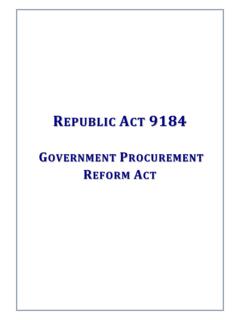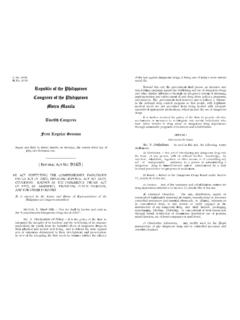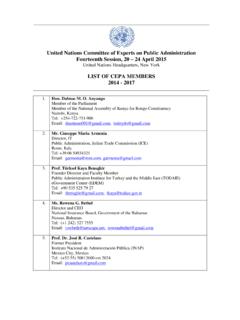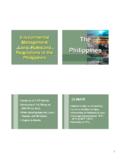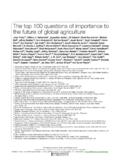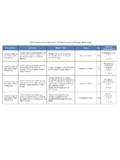Transcription of INCOME TAX CONVENTION WITH THE REPUBLIC …
1 INCOME TAX CONVENTION with THE REPUBLIC OF THE PHILIPPINES,AND AN EXCHANGE OF NOTESC onvention Signed at Manila October 1, 1976; with Exchange of Notes Signed at Washington November 24, 1976;Transmitted by the President of the United States of America to the Senate January 19, 1977 ( C, 95th Cong., 1st Sess.);Reported Favorably by the Senate Committee on Foreign Relations December 4, 1981 (S. No. 97-39, 97th Cong., 1st Sess.);Advice and Consent to Ratification by the Senate, with Reservations and Understandings,December 16, 1981;Ratified by the President, Subject to Said Reservations and Understandings, January 20,1982;Ratified by the Philippines September 1, 1982;Ratifications Exchanged at Washington September 16,1982;Proclaimed by the President October 16, 1982;Entered into Force October 16, EFFECTIVE DATE UNDER ARTICLE 29: 1 JANUARY 1983 TABLE OF ARTICLESA rticle 1----------------------------------Taxes CoveredArticle 2----------------------------------Gener al DefinitionsArticle 3----------------------------------Fisca l ResidenceArticle 4----------------------------------Sourc e of IncomeArticle 5----------------------------------Perma nent EstablishmentArticle 6----------------------------------Gener al Rules of TaxationArticle 7----------------------------------Incom e from Real PropertyArticle 8----------------------------------Busin ess ProfitsArticle 9----------------------------------Shipp ing and Air TransportArticle 10---------------------------------Relat ed PersonsArticle 11---------------------------------Divid endsArticle 12---------------------------------Inter estArticle 13---------------------------------Royal tiesArticle 14---------------------------------Capit al GainsArticle 15---------------------------------Indep endent
2 Personal ServicesArticle 16---------------------------------Depen dent Personal ServicesArticle 17---------------------------------Artis tes and AthletesArticle 18---------------------------------Priva te Pensions and AnnuitiesArticle 19---------------------------------Socia l Security PaymentsArticle 20---------------------------------Gover nmental FunctionsArticle 21---------------------------------Teach ersArticle 22---------------------------------Stude nts and TraineesArticle 23---------------------------------Relie f from Double TaxationArticle 24---------------------------------Non-d iscriminationArticle 25---------------------------------Mutua l Agreement ProcedureArticle 26---------------------------------Excha nge of InformationArticle 27---------------------------------Assis tance in CollectionArticle 28---------------------------------Diplo matic and Consular OfficersArticle 29---------------------------------Entry into ForceArticle 30---------------------------------Termi nationLetter of Submittal-----------------------of 12 January, 1977 Letter of Transmittal---------------------of 19 January, 1977 Notes of Exchange-----------------------of 24 November, 1976 The Saving Clause ---------------------Paragraph 3 of Article 6 MESSAGEFROMTHE PRESIDENT OF THE UNITED STATESTRANSMITTINGTHE CONVENTION SIGNED AT MANILA ON OCTOBER 1, 1976, BETWEENTHE GOVERNMENT OF THE UNITED STATES OF AMERICA ANDTHE GOVERNMENT OF THE REPUBLIC OF THE PHILIPPINES with RESPECT TOTAXES ON INCOME , AND AN EXCHANGE OF NOTESBETWEEN SECRETARY OF THE TREASURY WILLIAM E.
3 SIMON ANDSECRETARY OF FINANCE CESAR VIRATA INTERPRETING ARTICLE 23(2) OF THECONVENTION, DONE AT WASHINGTON ON NOVEMBER 24, 1976 LETTER OF SUBMITTALDEPARTMENT of STATE,Washington, , January 12, PRESIDENT,The White House. THE PRESIDENT: I have the honor to submit to you, with a view to its transmission to theSenate for advice and consent to ratification, the CONVENTION between the Government of theUnited States of America and the Government of the REPUBLIC of the Philippines with Respect toTaxes on INCOME , signed at Manila on October 1, 1976, and an exchange of notes betweenSecretary of the Treasury William E. Simon and Secretary of Finance Cesar Virata interpretingArticle 23(2) of the CONVENTION , done at Washington on November 24, 1976. The CONVENTION is similar in its essential respects to other treaties entered into by the UnitedStates in recent years. It deals mainly with Federal INCOME taxes in the case of the United Statesand with generally equivalent INCOME taxes specified in Article l (l)(b) in the case of thePhilippines.
4 Article 24, relating to nondiscrimination, applies, however, to taxes of every kindimposed at the national, state, or local level. The CONVENTION establishes maximum rates of withholding tax in the source country onincome payments flowing to residents of the other country. It reduces the statutory rates of 30percent in the United States and 35 percent in the Philippines, so that the maximum rate ofwithholding tax under the treaty is 25 percent on portfolio dividends and 20 percent on dividendspaid to a parent corporation owning 10 percent or more of the voting shares. The 20 percent limitapplies as well to the additional philippine tax on profits of United States corporations derivedthrough philippine branches. Since the philippine corporate tax rate is 35 percent, these limitsshould ensure that the philippine tax will be fully creditable to United States corporations. TheConvention provides a maximum tax at the source of 15 percent on interest in general, 10percent on public bond issues, and an exemption of interest paid to the Government of one of theContracting States or an instrumentality thereof, or interest on debt guaranteed or insured by thatGovernment or instrumentality.
5 In the case of royalties the CONVENTION provides a limit of 15percent at the source for the United States. The philippine tax at source is also limited to 15percent provided that the paying corporation is registered with the Board of Investments andengages in preferred areas of activity. In other cases the philippine tax is limited to 25 percent orto a lower rate if a lower rate applies on comparable payments to residents of third states. Thismost-favored nation provision means that the philippine tax on film rentals will be 10 percent,because that rate appears in their treaty with Sweden. The Philippines agreed not to tax rentals oftangible property as royalties. The taxation of business profits derived by a resident of the other country is governed by thestandard treaty concept that tax liability will arise only to the extent that the profits areattributable to a "permanent establishment" in the taxing country. The CONVENTION does not contain the usual reciprocal exemption of shipping and airlineprofits.
6 The Philippines is strongly opposed to such an exemption and has not agreed to it in anyother treaty. They agreed to reduce their statutory tax from 2 to I percent of gross receiptson outbound traffic and to provide in the treaty that the tax may not exceed the lower of the 1 percent rate or any lower tax agreed to with a third country. The United States accepted thisposition with respect to shipping profits but excluded United States airlines from this provision atthe request of representatives of the airlines. INCOME derived by a resident of one country from performing personal services in the othercountry is exempt from tax by that other country unless the individual remains there 90 days orlonger during the year or, in the case of services performed in an independent capacity, if thegross remuneration exceeds $10,000 or a higher amount agreed to by the tax authorities of thetwo countries; although gross remuneration determines whether a tax liability arises, the taxwould be imposed on net INCOME .
7 The 90-day period is consistent with the United Statesstatutory rule concerning employees of foreign companies in the United States. The condition forexemption of entertainers performing services in the other country is that the INCOME for suchservices not exceed the lesser of $100 per day or $3,000 per year. The non-discrimination issue is of great importance to both countries. The Conventionaffirms the principle of non-discriminatory tax treatment with respect to all taxes, but allows thePhilippines to reserve to philippine nationals incentives granted under specific provisions ofexisting law. These exceptions in brief permit: (1) a deduction for certain amounts invested innew shares of pioneer industries and a shorter holding period to qualify for capital gainstreatment on the sale of such shares; (2) a deduction for certain local costs of export productionto firms which are 60 percent philippine owned; and (3) limited incentives to investment intourist facilities.
8 The notes interpreting Article 23 (2) of the CONVENTION extend United States approval to thePhilippine practice of permitting a foreign tax deduction to philippine citizens abroad, rather thana foreign tax credit, so long as the rates of tax currently in effect remain unchanged. A technical memorandum explaining in detail the provisions and effect of the CONVENTION isbeing prepared by the Department of the Treasury and will be submitted to the Senate ForeignRelations Committee for consideration in connection with the CONVENTION . This CONVENTION will enter into force 30 days after the exchange of instruments of ratificationand will have effect with respect to withholding taxes on the following January 1, and withrespect to other taxes will have effect for taxable years beginning on or after January 1 of theyear following entry into force. The CONVENTION will then remain in force for five years andthereafter until terminated by either State.
9 Such termination may be effected by six months'written notice at any time after the initial five year-period. In that event the CONVENTION willcease to have force with respect to INCOME of years beginning on or after January 1 nextfollowing the six-month period. The Department of the Treasury, with the cooperation of the Department of State, wasprimarily responsible for the negotiation of this CONVENTION . It has the approval of bothDepartments. Respectfully submitted,SECRETARY OF STATELETTER OF TRANSMITTALTHE WHITE HOUSE,January 19, the Senate of the United States: I submit herewith, for Senate advice and consent to ratification, the CONVENTION signed atManila on October 1, 1976, between the Government of the United States of America and theGovernment of the REPUBLIC of the Philippines with Respect to Taxes on INCOME , and anexchange of notes between Secretary of the Treasury William E. Simon and Secretary of FinanceCesar Virata interpreting Article 23(2) of the CONVENTION , done at Washington on November 24,1976.
10 There is no CONVENTION on this subject presently in force between the United States and thePhilippines. The CONVENTION follows generally the form and content of most conventions of this typerecently concluded by this government. Its primary purpose is to identify clearly the tax interestsof the two countries so as to avoid double taxation and makes difficult the illegal evasion oftaxation. The exchange of notes confirms that certain provisions of the Philippines tax systemcomply with the CONVENTION . I also transmit, for the information of the Senate, the report of the Department of State withrespect to the CONVENTION . Conventions such as this one are an important element in promoting closer economiccooperation between the United States and other countries. I urge the Senate to act favorably onthis CONVENTION at an early date and give its advice and consent to R. THE PRESIDENT OF THE UNITED STATES OF AMERICAA PROCLAMATION CONSIDERING THAT: The CONVENTION between the United States of America and the REPUBLIC of the Philippineswith Respect to Taxes on INCOME was signed at Manila on October 1, 1976, and an exchange ofnotes interpreting Article 23(2) of the CONVENTION was signed at Washington on November 24,1976, the texts of which are hereto annexed.










